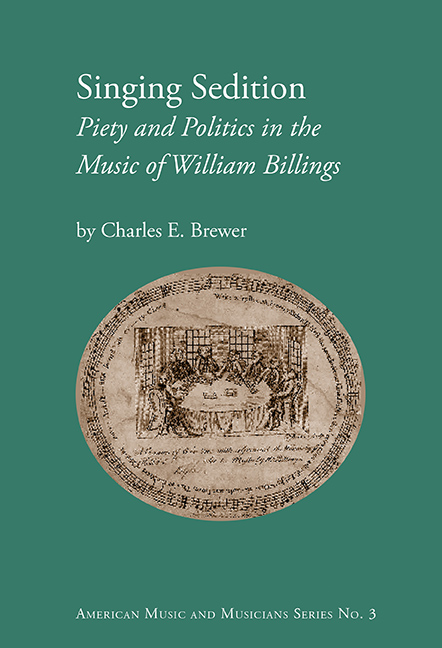Book contents
- Frontmatter
- Table of Contents
- List of Illustrations, Musical Examples, and Tables
- Prologue
- Acknowledgements
- Abbreviations
- Part I Rebellious Voices in Billings's Boston
- Part II Singing the Rebellion
- Chapter Three Shiloh and the Meanings of Christmas
- Chapter Four Billings's Anthems: Lamentation to Independence
- Chapter Five “Victory that Day was Turned into Mourning”
- Chapter Six “I Am the Rose of Sharon”: Rev. Samuel Cooper and William Billings
- Chapter Seven “Peace be on Earth, Good Will towards Men”
- Epilogue
- Appendices
- Bibliography
- Index
Chapter Seven - “Peace be on Earth, Good Will towards Men”
from Part II - Singing the Rebellion
- Frontmatter
- Table of Contents
- List of Illustrations, Musical Examples, and Tables
- Prologue
- Acknowledgements
- Abbreviations
- Part I Rebellious Voices in Billings's Boston
- Part II Singing the Rebellion
- Chapter Three Shiloh and the Meanings of Christmas
- Chapter Four Billings's Anthems: Lamentation to Independence
- Chapter Five “Victory that Day was Turned into Mourning”
- Chapter Six “I Am the Rose of Sharon”: Rev. Samuel Cooper and William Billings
- Chapter Seven “Peace be on Earth, Good Will towards Men”
- Epilogue
- Appendices
- Bibliography
- Index
Summary
Though the celebrations of thanksgiving for the Declaration of Independence in the summer of 1776 were very optimistic, as expressed by the phrase, “America victorious” in Billings's Independence, the Continental Army was suffering many significant setbacks. The arrival in New York harbor of the British army and fleet in the early summer and the resulting loss of New York by the patriot forces, along with the initial advance of a British invasion force from Canada, promised more British victories in 1777. Even Gen. Washington's victory at Trenton on 26 December 1776, was an anomaly in the midst of British success.
Billings must have succumbed to the melancholy mood felt by many during late 1776 and early 1777, and later remembered by John Adams: “I left Congress on the 11th of November, 1777, that year which the Tories said, had three gallows in it, meaning the three sevens… .” Certainly, the British had reasons to presume that their military actions in 1777 might soon bring the traitorous patriots to justice. The surrender of Fort Ticonderoga on 6 July 1777 to the advancing British invasion force from Canada and the abandonment of Philadelphia on 26 September, forcing the members of the Continental Congress to flee from the city, were significant setbacks. Even the negotiations for French aid were stalled due to the lack of victories by the American forces. However, the dark mood of Congress and the morale of the Americans changed rapidly following the defeat and eventual surrender Gen. Burgoyne's army to Gen. Horatio Gates on 17 October 1777 following the second Battle of Saratoga.
RETROSPECT: WAS NOT THE DAY DARK AND GLOOMY?
The response in Boston to the good news was rapid; provincial representatives of Massachusetts-Bay on 20 October 1777 sent out the broadside proclaiming Thursday, 20 November 1777, as “a Day of Thanksgiving and Prayer” since God “hath so far supported us in our Exertions against the arbitrary Claims and military Violence of Britain; and especially in a late Instance of Divine Interposition, in which the Arm of the LORD of Hosts and GOD of Armies very conspicously appears, hath given us a compleat Victory over a whole Army of our Enemies.”
- Type
- Chapter
- Information
- Singing SeditionPiety and Politics in the Music of William Billings, pp. 207 - 234Publisher: Boydell & BrewerPrint publication year: 2017



